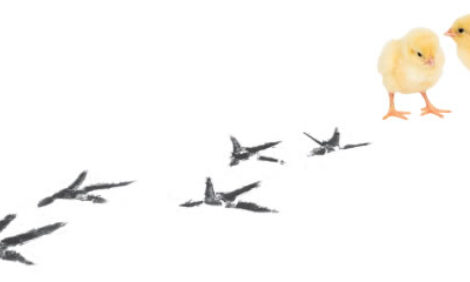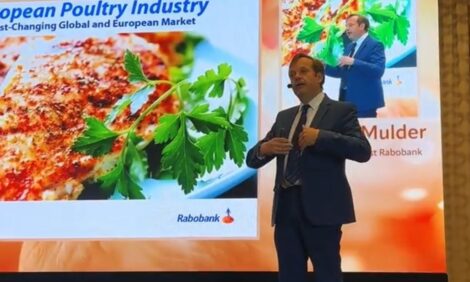



Challenges and Opportunities for the British Poultry Sector
At the British Pig and Poultry Fair earlier this month, industry experts outlined the challenges facing the country's poultry industry and how these can be turned into opportunities, writes Jackie Linden, editor of ThePoultrySite.A forum at this year's British Pig and Poultry Fair, chaired by National Farmers' Union (NFU) Poultry Board chairman, Charles Bourns, aimed to help producers see the challenges facing today's industry as opportunities for the future.
Recent and Present Challenges for the Poultry Industry
"The business environment for the poultry industry has been challenging in recent years, unsupported as the industry is by the Common Agricultural Policy," said Robert Newbery, the National Farmers' Union Chief Poultry Advisor in the introduction to his presentation.
The first challenge he identified was that of consumer perception. Mr Newbery reminded the audience that in 2007, two celebrity chefs uncovered what were perceived to be problems in the industry, and the resulting television programmes caused considerable damage to the industry. Unfortunately, they also overshadowed the improvements that had been made under the quality assurance schemes of the Red Tractor and Lion Mark.
Another significant problem, he said, is the conflicting demands of the market, which wants better animal welfare through free-range systems, lower stocking density and slower growing birds as well as lower environmental impact through better feed conversion and controlled/contained atmosphere buildings.
"Which way should the industry go?" asked Mr Newbery.
As a result of these factors, predicting the market has become very difficult, he said. This includes estimating the demand for products from alternative systems, currency exchange rates, the impact of the economic crisis and the need to balance supply and demand. Mr Newbery gave as examples the egg industry, which has increase output by more than 4,000 cases (1.44 million eggs) since the last quarter of 2009, and the broiler industry, which is gradually increasing the number of broiler chicks placed.
Inputs and costs have presented the poultry industry with huge challenges, he said, highlighting the fluctuations in feed ingredients prices in 2008 and 2009. As he pointed out, feed makes up 55 to 60 per cent of the cost of egg production, and 55 to 65 per cent for broilers. Many businesses are mitigating these changes by hedging and forward purchasing.
However, as Mr Newbery said, it is not only feed prices that present challenges to producers. Energy and water prices are also rising, and the former is subject to world prices. As trained staff are in short supply, they too are becoming more expensive, and regulatory costs and permits are going up in terms both financial and in time required.
Capital and infrastructure for future production is a concern and its extent was revealed in an NFU survey last year, which showed that many poultry buildings are more than 20 years old and a quite a few were built more than four decades ago. Very little investment in buildings has been made in the last 10 years because of poor returns, restricted access to credit because of the economic situation, the difficulties in obtaining planning permission and the new requirements for environmental permits. There are signs, however, that producers are beginning to invest again.
Last but by no means least on Mr Newbery's list of challenges facing today's poultry industry is a whole raft of regulations. These include environmental aspects (IPPC and the Habitats Directive), planning, health and hygiene, welfare (broiler directive and the layer cage ban) and finally, animal health cost sharing. And, as Mr Newbery concluded, all this is occurring at a time when the new government is facing budgetary cuts.
Opportunities for the Industry
David Whiffen, the poultry buyer for supermarket Sainsbury's, shared his view with the forum audience that there are good opportunities for the poultry industry, which he summarised as the growing demand for British foods and those produced to higher welfare standards, as well as cost savings.
He said that their customers tell them they are uncertain about the economic situation, with two-thirds cautious about their finances and thinking about their budgets. This is very good news for the chicken industry, Mr Whiffen said.
Customers are also looking to their supermarket to provide ethical leadership, and he said Sainsbury's is highly rated on ethical issues.
Finally, customers want British products because to them, this means freshness and high standards for animal welfare and environmental impact. Sainbury's now sells only British chickens, said Mr Whiffen, and sales are five per cent higher this year. With a value of £383 million, the supermarket has a 22 per cent market share, making it the second largest chicken retailer in the country. With sales of 1.33 billion eggs, it has an 18 per cent share of the egg market.
Last year, Freedom Food items, which meet higher standards of animal welfare, was Sainsbury's fastest growing segment – ahead of the value range despite the recession – and in the next three years, they will receive 15 per cent more shelf-space and sales are predicted to grow 10 per cent.
This will require the supermarket to source £82 million more chicken. Mr Whiffen explained that there are already long-term relationships with Vion, 2 Sisters, TNP and Moy Park and the retailer aims to get closer to farming groups.
Demand for chicken produced to higher welfare standards is another great opportunity for the UK industry, he said. Even in the recession, higher welfare products outgrew the value range.
And the third opportunity identified by Mr Whiffen is that of saving money by reducing waste, particularly packaging. Sainsbury's carbon footprint model has saved money for its dairy suppliers and the scheme is being rolled out to its chicken and egg suppliers in 2011. Investing just three hours of time can bring savings of £7,000 to 11,000, he said.
In answer to a question from the audience, Mr Whiffen said that Sainsbury's will continue to sell organic eggs because some customers want them, but he acknowledged that the market is still declining.
He also stressed the long-term relationships that the supermarket has built up with suppliers that will be needed to meet the growing demand for higher welfare, British products.
Forum chairman, Mr Bourns, stressed that producers need long-term commitment from the supermarkets because of the high cost and urgent need for investment in new poultry buildings.
He added that the mood at the British Pig and Poultry Fair was very positive, as it is at Sainsbury's and he expressed the hope that the same is true of other retailers.
May 2010








